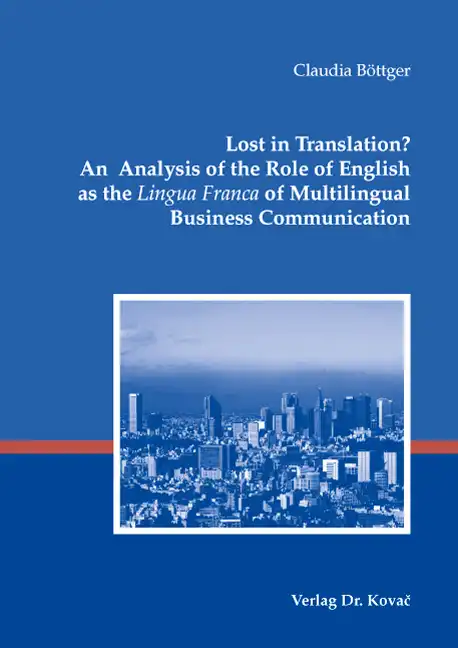Claudia BöttgerLost in Translation? An Analysis of the Role of English as the Lingua Franca of Multilingual Business Communication
PHILOLOGIA – Sprachwissenschaftliche Forschungsergebnisse, Band 107
Hamburg 2007, 330 Seiten
ISBN 978-3-8300-2930-4 (Print)
ISBN 978-3-339-02930-0 (eBook)
Rezension
[...] liefert die Arbeit [...] viele interessante Beobachtungen zu Sprachveränderungsprozessen in der mehrsprachigen Wirtschafts- und Finanzkommunikation. Sie beindruckt durch die zu den Einzelfragen vorgenommenen linguistischen Detailanalysen, die zu einem besseren Verständnis von Sprachveränderungsprozessen in einer globalisierten Welt beitragen. [...]
Zum Inhalt
The study explores the influence of English as a lingua franca on multilingual business texts, in the context of the growing Americanisation of German business communication. It is based on the central hypothesis that the dominance of lingua franca English leads to a convergence with Anglophone text conventions in translations into German. This hypothesis is tested using two genres within annual reports: letters to shareholders and corporate statements, which include texts such as visions, missions, and corporate values.
The methodological framework used for the synchronic and diachronic analyses is the systemic-functional Translation Assessment Model developed by House (1977/1981, 1997), integrating a functional pragmatic approach. The focus of the qualitative analysis is on the linguistic means characteristically employed to establish an intersubjective author-reader relationship in business texts, here referred to as Corporate Rhetoric.
The diachronic analyses show that Anglophone text conventions are not only adopted by German translations, as was hypothesised, but also by German original texts. It is argued that this development is due to the adoption of US annual report conventions as models for German annual reports, particularly with respect to the use of Corporate Rhetoric. Furthermore, the diachronic analyses suggest that in the process of translating from German into English, increasingly German text conventions are maintained. The study claims that this may lead to a hybridisation of the lingua franca and in turn to a new domain-specific variety of English. Standardisation on the one hand and hybridisation on the other are therefore seen as two sides of a domain-specific language change process. The study closes by sketching where these findings might be applied within multilingual business communication.
Kontaktmöglichkeit
Schlagworte
Annual reportContrastive pragmaticsCorporate rhetoricDeutschEnglischEnglishGermanIntercultural business communicationInterkulturelle WirtschaftskommunikationKommunikationKontrastive PragmatikLanguage changeLanguage contactLingua FrancaLingua franca communicationMehrsprachigkeitMultilingual business communicationMultilingualismSprachkontaktSprachwandelSprachwissenschaftText linguisticsTextlinguistikTranslation StudiesIhr Werk im Verlag Dr. Kovač
Möchten Sie Ihre wissenschaftliche Arbeit publizieren? Erfahren Sie mehr über unsere günstigen Konditionen und unseren Service für Autorinnen und Autoren.
